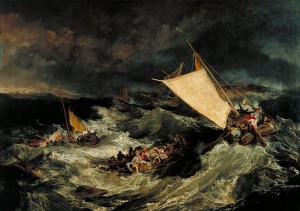 Upon reading stories of sea disasters in my youth, I have often wondered what it’s like to be shipwrecked. There is an element of adventure in being marooned since one must rely upon one’s own resources. I am especially fascinated by the human element in such disasters since one must deal with other survivors. I have always been interested in how a small society might arise out of such misfortunes and how leaders come forth. Such an experience might give us insight into how we might find unexpected solutions in our present socio-economic crisis.
Upon reading stories of sea disasters in my youth, I have often wondered what it’s like to be shipwrecked. There is an element of adventure in being marooned since one must rely upon one’s own resources. I am especially fascinated by the human element in such disasters since one must deal with other survivors. I have always been interested in how a small society might arise out of such misfortunes and how leaders come forth. Such an experience might give us insight into how we might find unexpected solutions in our present socio-economic crisis.
My desire for such an experience was fulfilled when I actually found myself “shipwrecked,” and I was able to observe firsthand how a group of ordinary people—once mugged by the reality of their fate—react and interact. It was a very revealing experience.
Being shipwrecked in our days is not as rare as it might sound. In fact, I believe a lot of Americans have experienced the modern equivalent of such disasters. It is no longer a rare event since air travelers are often confronted with cancelled flights—especially in bad weather. Suddenly, one can find oneself shipwrecked at a strange airport with no immediate means to return home.
My particular experience involved a short 40-minute evening flight home from a major hub. I was talking on the phone with a friend when I noticed a commotion around the airline counter, at the gate. Since I had not heard the announcement because of my phone conversation, I approached someone and asked what had happened. The flight was cancelled. I was shipwrecked at the airport—so close, yet so far from my destination.
An airline employee was abandoning ship since it was time for him to go home. He quickly explained the options to a very upset crowd of tired travelers. He told us we could either stay the night and possibly catch a morning flight or take a bus that would make a three-hour trip to our destination airport. To those who would take the bus, he handed out $10 food vouchers, told people to meet upstairs in one hour and took off. It was every man for himself.
The passengers scattered. It was as if each of us were our own cancelled flight with nothing in common with the other. Even condoling conversation was limited. When a few gathered upstairs before the hour, there was no airline official there or indications as to what should be done.
No one was really sure what to do. Someone said that a bus was waiting outside down the lane. Suddenly people started taking off for the bus intent upon getting a good seat. I stayed and watched as there was no one to inform the others who were arriving about the bus. Each only thought of his or herself. No one made any special effort to help any fellow passenger with their bags or show any other courtesy.
Eventually an airline employee did arrive to indicate the way to go. But there was no checklist of passengers or concern about who might or might not arrive in time. Everyone was an individual atom that only interacted with the others to the extent it impacted their way home. Aboard the bus, everyone sat in silence as we made our way to our destination, with many checking their cell phones or texting.
I guess I had expected some kind of Hollywood dramatics to kick in during the “shipwreck.” I had imagined there should have been some kind of camaraderie in misfortune. However, all I felt was the cold individualism of self-interest. It was Hobbes’ “war of every man against every man” that ruled.
Of course, it was a very short shipwreck, and there was really no time for a society to  develop. There was still some rescue system in place that got us to our destination amid the chaos. But, I could not fail to ask myself what would have happened if that system had failed? How would we have resolved our problem? Would we have, could we have, pulled together in face of adversity?
develop. There was still some rescue system in place that got us to our destination amid the chaos. But, I could not fail to ask myself what would have happened if that system had failed? How would we have resolved our problem? Would we have, could we have, pulled together in face of adversity?
I think the incident provided insight into our American situation. There are many who, in face of the nation’s present crisis, imagine they can simply do as my fellow passengers did during our “shipwreck.” They think that they (or their home states or counties) will simply secede from the rest and happily go their own way, oblivious to any others. They will interact with others only to the extent it impacts their own self-interest. They will confide in some kind of invisible system, like the bus, that will make their secession happen without any major disruption to their lives.
But when a crisis greater than themselves threatens, I question whether they will be able to deal with it alone. The secession that seems such a practical way to take care of oneself will suddenly become a source of weakness and fragmentation at a time when strength and unity will be needed.
There are times—true shipwrecks—in history when everyone needs to pull together in face of adversity. These are events so challenging that we are forced to appeal for God’s help. America has faced these events before. She overcame them and came out the better for the experience. I believe we are fast approaching another shipwreck where we need to think beyond the bus.
We Must Resist the Temptation to Secession
The Case Against Secession


